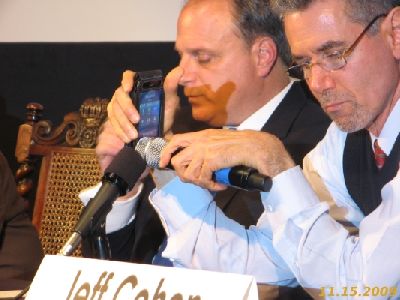Health Care Justice Forum at Dryden Theater
Primary tabs
The Dryden Theater hosted a public forum on health care justice November 15, 2009. It was organized by Progressive Democrats of America and moderated by Jeff Cohen, a journalism professor and founder of the media-monitoring group Fairness and Accuracy In Reporting(FAIR).
The House of Representatives recently passed bill HR3269 which was intended to make health care more accessible and affordable. Republicans and 39 Democrats voted against the bill, mostly over concerns of cost or ideology. But two of those Democrats, Dennis Kucinich of Ohio and Eric Massa of the 29th district in New York which includes parts of Rochester, voted against it for a different reason. The bill does not go far enough in addressing health care inequity in America. Massa was present at the conference and Kucinich called in by phone. Both Democratic representatives favor a different approach toward health care reform, HR676 which would expand the current Medicare system to all Americans beginning at birth. HR676, sponsored by Rep John Conyers (D-Michigan) was never put to a vote. Conyers attended a similar conference here in May and was invited to this one, but could not attend. Also present were Donna Smith of the California Nurses Association, who appeared in Michael Moore's documentary Sicko, Steve Cobble, the founder of Progressive Democrats of America and Dr Emily Queenan, MD, a member of Physicians for a National Health Plan (PNHP).

The US health care system is dysfunctional and broken. The USA rates 50th in the world in life expectancy. Nearly 50 million people have no health insurance. Those without insurance are 40 percent more likely to die. Even for those who have insurance, much of it is inadequate. Loss of a job or illness can lead to loss of insurance as well.

Rep Massa was there to explain his “No†vote on HR3962, which was supposed to make health insurance universal and more affordable. The bill that was passed did neither. It did nothing to contain cost. It continued to rely on private, for-profit health insurance. The point of delivery is still place of employment. It requires employers to provide insurance or pay a surcharge. But what if the employer finds that paying the surcharge costs less than insurance? This would not insure anyone. The bill would set up a private “insurance exchange†but not the sort of government operated public program present in every other industrialized country. It also dismantles the federally subsidized State Children's Health Insurance Program (SCHIP). I was elected specifically to enhance SCHIP, says Massa. The bill also contains cuts to Medicare, which would force senior citizens into more costly supplemental private insurance. This bill consisted of 1957 pages and I read every one of them before voting against it. By comparison, John Conyers' HR676 was 4 pages; Einstein published his Theory of Relativity on one page. Every single specialty group in the current system was represented in this bill. This bill takes what's wrong with the current system and intensifies it.
But the bill contained an even more onerous provision. The Stupak-Pitts amendment, which was part of it, would forbid coverage of abortion by the Government, or by any private entity participating in a Government or Government-funded program such as the insurance exchange. I promised not to legislate reproductive rights says Massa.

The next speaker was Donna Smith of the California Nurses Association. The Association is in the process of merging with nurses associations in other states, which will make it the largest advocate for single-payer health care in the nation. We want two things: A system that will allow me to get the care I need, and will keep me from going bankrupt.
Smith also commented on some of the lies the public is being told. President Obama likes to say If you like what you've got you can keep it. But that's not true of employer-based insurance. What about those who lose their jobs? Or those whose employer changes or eliminates benefits? Or change jobs, move, get widowed or divorced and get denied because of a pre-existing condition? Smith called the Stupak-Pitts amendment the worst infringement ever legislated. It affects only women. Women are already under-represented, under-employed and lack income parity. This is discrimination.

During the discussion the panel received a call from Rep Dennis Kucinich (D-Ohio), another progressive Democrat who voted against the bill. He explained how the political establishment has paired up with the insurance companies; insurance companies are supposed to make money by not providing care. The bill has now gone to the Senate and will then be reconciled by a House-Senate committee. We need to engage that conferencing process, unlock this bill and move forward. He had some encouraging words for the audience: You are going to be a part of the rescue of health care in America and single payer will be part of the plan.

Steve Cobble of Progressive Democrats of America was the next speaker. Single Payer may be off the table but it's still in the house. We aren't dealing with health care disparity; we didn't do what other nations did. One solution Cobble brought up, which is not in the House bill is the “State Solution.†This would empower individual states to pursue health care solutions on their own. The successful Canadian system started in this manner in the province of Alberta. There is a State provision in the Senate health bill, S703, sponsored by Senator Bernie Sanders (Independent-Vermont). Massachusetts, California, Pennsylvania, New Mexico, Colorado and Illinois are currently considering their own programs. New York needs to be added to that list! The American people want a single-payer public option. It is the mainstream media, their pundits, and corporate ownership who do not.
The final speaker was Doctor Emily Queenan, a primary-care physician and member of Physicians for a National Health Program. Every day the insurance industry invades my practice stepping between me and my patients. The current bill only addresses access to health insurance, not health care. People with low paying jobs cannot afford significant out of pocket expense. I receive different levels of pay for the same treatment, depending on my patient's insurance. I can't give away my services and pay my bills too, so I have to compromise care. Queenan says she didn't go into medicine to get involved in politics, and so is glad to be “accompanied by these experts†(referring to the other panelists). The current system is untenable. It's like aspirin for breast cancer.
Discussion was followed by questions from the audience and one question on everyone's mind was cost. How much will health reform cost, and will it increase taxes or the deficit. Massa replied with this comparison: We are about to spend in Afghanistan twice what we intend to spend on single-payer. Yet members of Congress can't wait to get on board that bill.
The question of tort reform as a cost-reducing measure was brought up. Some states have attempted to cap malpractice awards but none of them have resulted in lower cost to patients. If there are any savings at all, the companies pocket them. Massa replied saying rather than limiting patients right to redress malpractice, a “Standard of Care†should be adopted. This is already successfully done by the Veterans Administration, Medicare and Medicaid. Dr Queenan pointed out the need to get away from “defensive medicine†which encourages costly tests and specialists. Instead, a more relationship-oriented rather than procedure-oriented interaction between doctor and patient needs to be implemented.
Another common question was what can we do to bring about single payer? Right now our best hope is in the Senate. Write or call Senator Sanders and get him more votes. Senator Gillibrand is already on board, pressure Senator Schumer to take a stand as well. Contact New York State legislators and senators, and insist they look into a single-payer system at the State level. We also need to counter intimidation by an ugly, shrill minority who oppose reform not on logic but emotion. We (progressives) don't understand the depth of their belief system says Massa. Most of Massa's opposition comes from small towns in the Southern Tier. Contact newspapers in those towns with letters to the editor. Don't feel powerless. Quality affordable health care is in their interest too. There are blogs and organizations like PDA to join.
Jeff Cohen compared Rep Massa to a young Rep Abraham Lincoln in his opposition to the US waging war on Mexico. Anyone who says I shy away from controversy hasn't looked at my voting record says Massa. We have reached a fork in the river on health care. One branch leads to single payer. The other goes over Niagara Falls. Don't “fall†for lies. Democracy only works if you vote!
video of forum: http://blip.tv/file/2871451








